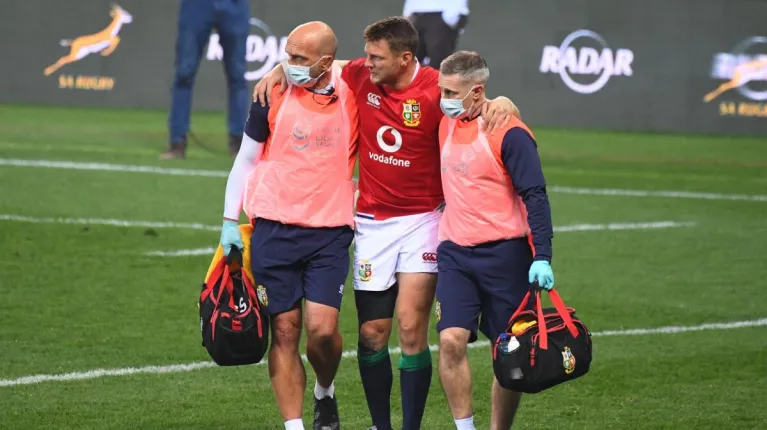'When Russell comes on we either win by 20 points or lose by 20'

The Lions' hopes of clinching Test series victory against the Springboks encountered a huge moment of intrigue just eleven minutes into Saturday's deciding third match in Cape Town when Dan Biggar, their first choice out-half, limped out of the contest and was replaced by Finn Russell.
Biggar, whose right knee was heavily strapped at the start of the match, was injured when painfully tackling Lukhanyo Am inside the Lions 22 and following a period of treatment on the pitch, he hobbled his way to the sidelines and it resulted in the introduction of Russell for his Lions Test debut after he got the nod ahead of Owen Farrell to sit on the third Test bench.
The arrival of Russell into the match at such an early juncture was greeted with curiosity by the Sky Sports team commentating live on the match in the UK and Ireland. Will Greenwood, the ex-Lions centre and 2003 England World Cup winner, said: "We love him but when Finn Russell comes on we either win by 20 points or lose by 20, there is no middle ground.
"I don't think he has played in five weeks but he is obviously fit. He will have come through some serious training sessions this week but wow, if you look at the fly-halves (Warren) Gatland has picked over the years, Russell coming on in the eleventh minute is a change in strategy, a complete change of strategy."
Sam Warburton, the Lions skipper on the 2013 and 2017 tours to Australia and New Zealand, added: "It is fascinating that there is a change at No10 this early. It will be fascinating to see how the Lions change their approach, if they do."
Lions boss Gatland had admitted last month that Russell might have to quit the tour if his achilles injury didn’t respond to treatment and he even called up Marcus Smith on July 10 to provide cover given the Scottish player’s layoff following a July 7 injury when playing as a sub versus the Sharks. However, the situation eventually turned out positively for Russell and he took Farrell’s place on the Test bench with the series outcome going down to the wire.
Russell was soon in the thick of the action in Cape Town, landing a 16th-minute penalty to pull the Lions level at 3-all and he then added the conversion to Ken Owens' 19th-minute try for a 10-3 lead. The Lions went on to reach the break 10-6 ahead with Russell the big focus of attention in Biggar's absence.
"With Finn Russell coming on, crikey, what a 30 minutes or so he has had," continued ex-Lions boss Ian McGeechan at half-time. Ronan O'Gara, a three-tour Lions selection, added: "Simply, he is the best man to pick apart a rush defence. Why do I say that? Because he is probably the most instinctive player in Europe certainly. Do not be fooled by his smiley, lazy, laid-back approach.
"I know Mike Prendergast, who coaches him at Racing, and he says he is hugely diligent, highly involved in studying the game inside out. His capacity to execute is better and he just has an extra zip in his pass. He is knocking on the door and these passes will pull them [South Africa] apart as the defence fatigues later in the game." O'Gara's prediction didn't come true, however, as the Springboks were ultimately victorious, 2009 series hero Morne Steyn landing a 79th-minute penalty to clinch the 19-16 victory.
Latest Comments
Pathetic.
Go to commentsI actually don't see the current situation as a result of central contracting. If the problem has been years in the making, it's more likely to be rot rather than a issue issue needing a tweak. But whatever… you say potato, I say blight.
Go to comments